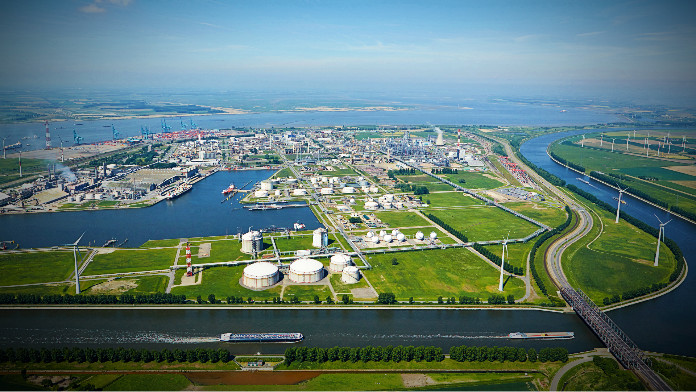German chemical company BASF is to deploy a private 5G network at a facility in the Port of Antwerp in Belgium with the help of local networking specialist Citymesh. The development, which actually follows a number of cellular-linked Industry 4.0 trials in the area, has been billed in the local press as “the first private 5G network” in the port. It is linked, RCR Wireless understands, with a government pledge of €20 million this week for 21 enterprise-related 5G projects; French operator group Orange is to lead at least 11 of these new schemes.
The suggestion that the new Citymesh installation, scheduled to be built at the BASF facility in the port area over a period of two years, is a ‘first’ in the port area seems curious. Belgian operator Proximus said three years ago it had a deal with the port authority to develop a private 5G network to drive digital change for port enterprises and services; the Proximus project was pegged for a six-month pilot phase initially, to test various Industry 4.0 applications.
Moreover, Orange has previously announced a wide-area private 5G campus testbed at the port, with BASF lined up alongside a “first wave” of industrial companies at the site, which also included chemical company Borealis, and polymer manufacturer Covestro, as well as the port authority, itself. The work was focused on port logistics, ship-to-shore data streaming, remote AR and field inspections, AI-geared quality inspections, and critical communications. That was two-a-half-years ago.
The timing might, perhaps, explain the perceived novelty of the new private 5G installation, as higher-grade industrial 5G NR has since come available with Releases 16 and 17 of the 3GPP standard. These other installations may also have run their courses, and failed as commercial exercises. They may also – actually, and probably – have leaned more heavily in the end on private LTE (4G), than on 5G actually; plus both announcements now look like wider-area projects, relying in part or entirely on licensed spectrum and operator infrastructure.
But they show, also, that the Port of Antwerp has been a busy field of experimentation for cellular-based Industry 4.0 – even if both the country’s broader public 5G rollout and its private 5G regulation have been slow. But Citymesh, a pioneer in the private networks game, has spectrum of its own, including at least 100MHz of the 3.5 GHz band, plus something at around 700 MHz, and an enterprise MVNO deal with Proximus in the country, and has been installing Industry 4.0 cellular for some years.
It has already deployed private cellular networks at the Port of Zeebrugge and Brussels Airport; local press reports also cite installations in Genk and Wallonia – without stating their precise location or authorship. But Citymesh also claims deals with 75-odd cities in Belgium, plus a number of major exhibition halls, healthcare facilities, warehouse and logistics venues, and, notably, offshore wind farms and oil fields. It announced a new fleet of 70 5G-connected ‘safety drones’ to support local emergency services a couple of days ago.
The local business press quoted Citymesh and BASF, stating: “More bandwidth is optimal for security; 5G helps with fire prevention, monitoring installations or teams, and it increases the overall efficiency of the port.” They have earmarked the network for push-to-talk comms, security camera streams, and “logistics processes”; there is vague mention of deploying machine vision apps to live-monitor plant equipment, as well. The pair want to open up “their experience to the entire sector and, by extension, to the 5G community in the industry,” said one report.
BASF is in the process of building a new production plant – for alkyl ethanolamines, a chemical group comprised of amino acids and alcohols used in cosmetics and cleaning products – at its integrated (‘Verbund’) site on the harbour in Antwerp. The existing facility covers an area of 600 hectares and includes 54 linked production plants – so “raw material from one installation is processed into the final product in the other”. The plan is for production to jump by 30 percent to more than 140,000 tons per year. Private 5G will driver higher automation and intelligence.
Meanwhile, Belgian telecoms minister Petra De Sutter this week said the country is falling behind on 5G, and has announced a €20 million funding package for 21 smart-industry (or -city) projects to convince local enterprises they should invest in the technology. De Sutter commented: “We need to change that. The 21 projects we are proposing today are an important stage in us catching up, because each of them bets on innovative applications.” Among them, it has allocated funding for thermal fire-and-rescue imaging, road accident alerts, and smart traffic intersections.
It is unclear if the Citymesh drone project, which will see 70 drones equipped with 4K cameras and 5G radios, has received state funding. Orange has said the same about the country’s sluggishness on 5G, when declaring its own hand in at least 11 of the new government schemes. “Belgium is behind in the deployment of 5G in the seven European countries where Orange is present,” it stated. Orange plans to deliver 5G coverage to 40 percent of the Belgian population by the end of 2023, it said, and 90 percent coverage by the end of 2025.
Orange has opened a second ‘5G Lab’ in the country, in Liège; its first was the home for its 5G campus work in the port of Antwerp, back in 2020/221. Orange talked about 5G for the healthcare, transport, media, and military sectors, plus for public security and smart cities. It has an infrastructure sharing venture with Proximus to deploy and active 5G antennas in the country. The country has not ruled on spectrum for private enterprise usage, as yet.

